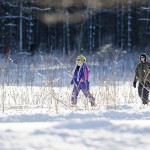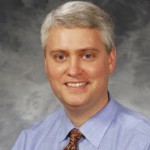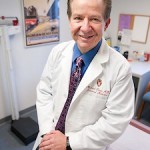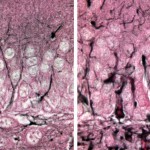Tag Health & medicine
Stem cell advance yields mature heart muscle cells
A team of University of Wisconsin–Madison researchers has induced human embryonic stem cells (hESC) to differentiate toward pure-population, mature heart muscle cells, or cardiomyocytes.
Wisconsin Partnership funds five new studies
Five researchers at the University of Wisconsin School of Medicine and Public Health (UWSMPH) have received grants through the Wisconsin Partnership Program’s New Investigator Program.
Thriving, rather than surviving, is key to winning winter
After months of cold temperatures, cloudy days and snow, it’s no wonder that many of us think bears have the right idea during the winter.
Students to vote on campus recreational sports improvements
A significant upgrade to the campus’ heavily used recreational sports facilities will be one of the options facing students during the University of Wisconsin–Madison spring student elections, held March 3-5.
UW-Madison scientists to use high-density EEGs to benefit epilepsy patients
University of Wisconsin researchers pioneered the use of high-density electro-encephalograph (HD-EEG) technology to study sleep patterns and the effects of meditation. With support from a local grassroots organization, Lily's Fund for Epilepsy Research, UW–Madison researchers will now evaluate how this advanced technology might benefit people with epilepsy.
Article by UW–Madison expert highlights 50th anniversary of surgeon general’s smoking report
An article co-authored by the University of Wisconsin–Madison's Dr. Michael Fiore marking the 50th anniversary of the first U.S. Surgeon General's report on smoking was published Tuesday by the Journal of the American Medical Association.
CALS researchers developing novel treatment for septic shock
By the time doctors diagnose septic shock, patients often are on a knife’s edge. At that point, for every hour that treatment is delayed, a person’s risk of death rises an alarming six percent.
Making a better flip-flop to overcome illiteracy and disease
In many parts of the world, a good share of the population wears flip-flops. In America, the candy-colored sandals are a ubiquitous herald of summer. In rural Uganda, kids wear them, adult men and moms wear them whether they're bopping around the compound, working in the fields or getting water.
Documentary connects multiple sclerosis, Vikings and Nordic skiing
Multiple sclerosis (MS), a neurological disease that affects more than 400,000 Americans, attacks the nervous system and causes many symptoms, including difficulty moving. But many who suffer from the disease defy its effects by maintaining an active lifestyle.
Poverty influences children’s early brain development
Poverty may have direct implications for important, early steps in the development of the brain, saddling children of low-income families with slower rates of growth in two key brain structures, according to researchers from the University of Wisconsin–Madison.
Tip: The 12 days of experts
For many, the holiday season brings joy, fun and cookies. Lots of cookies.
Study reveals gene expression changes with meditation
With evidence growing that meditation can have beneficial health effects, scientists have sought to understand how these practices physically affect the body.
Researchers discover early step in blood stem cell development
University of Wisconsin School of Medicine and Public Health (SMPH) researchers have discovered a very early regulatory event that controls the production of blood stem cells and the adult blood system.
Rare disease yields clues about broader brain pathology
Alexander disease is a devastating brain disease that almost nobody has heard of — unless someone in the family is afflicted with it. Alexander disease strikes young or old, and in children destroys white matter in the front of the brain. Many patients, especially those with early onset, have significant intellectual disabilities.
New look identifies crucial clumping of diabetes-causing proteins
People get type 2 diabetes. So do cats. But rats don’t, and neither do dogs. Subtle differences in the shape of proteins protect some and endanger others.
Discovery sheds light on how changes in lungs can hurt the heart
A team of University of Wisconsin–Madison researchers has discovered important biomechanical changes in human arteries that could increase understanding of how pulmonary hypertension leads to heart failure.
Mackie’s goal: use what we’ve learned to help humanity
The Wisconsin Institute for Discovery's monthly Tools for Discovery profile features Rock Mackie, director of the medical devices research group at the Morgridge Institute for Research.
WARF Innovation Award winners offer a better oat, infection disrupter
A new oat offering tasty ways to lower cholesterol and compounds capable of disrupting serious bacterial infections earned top honors in this year's Wisconsin Alumni Research Foundation Innovation Awards program.














